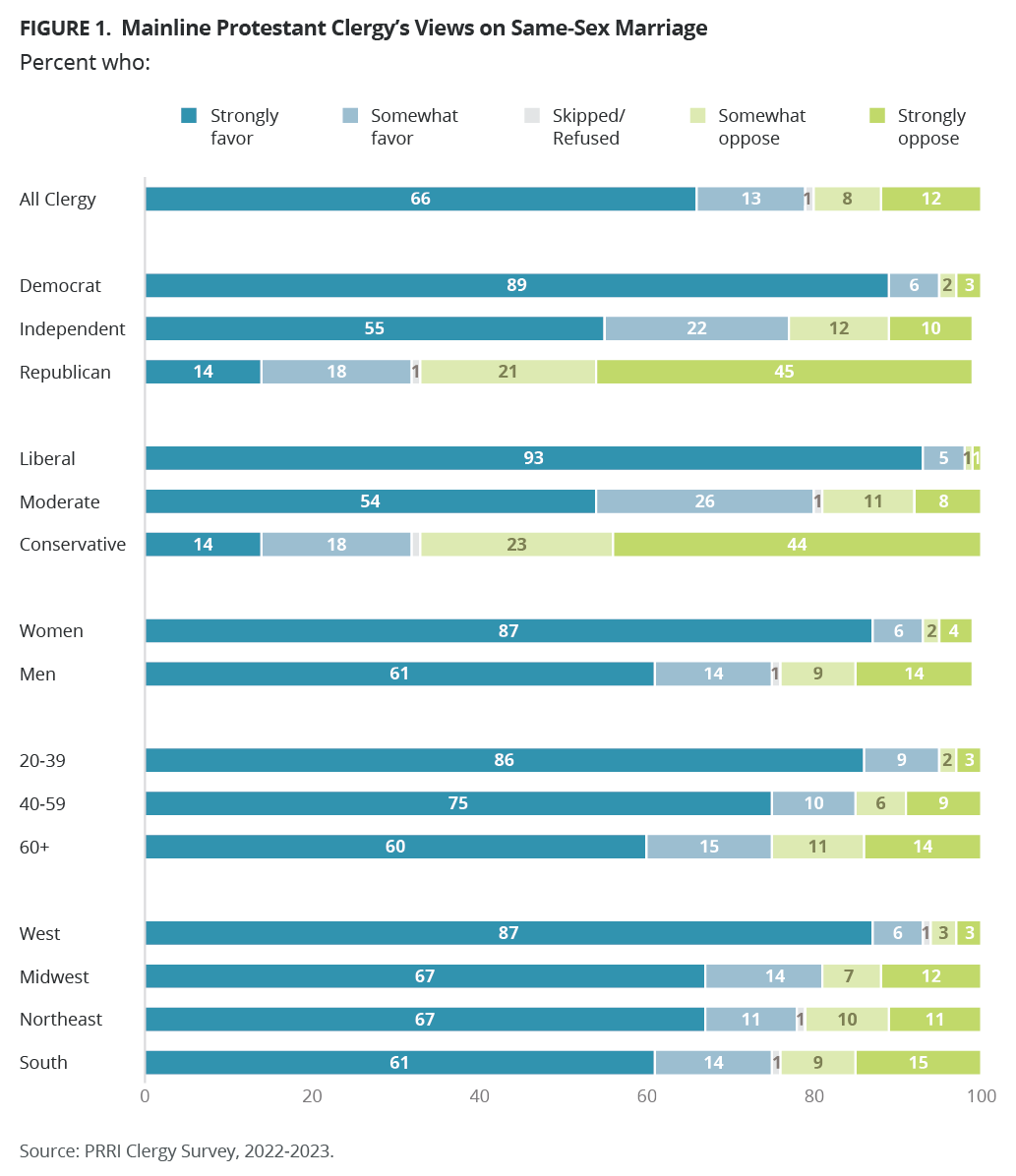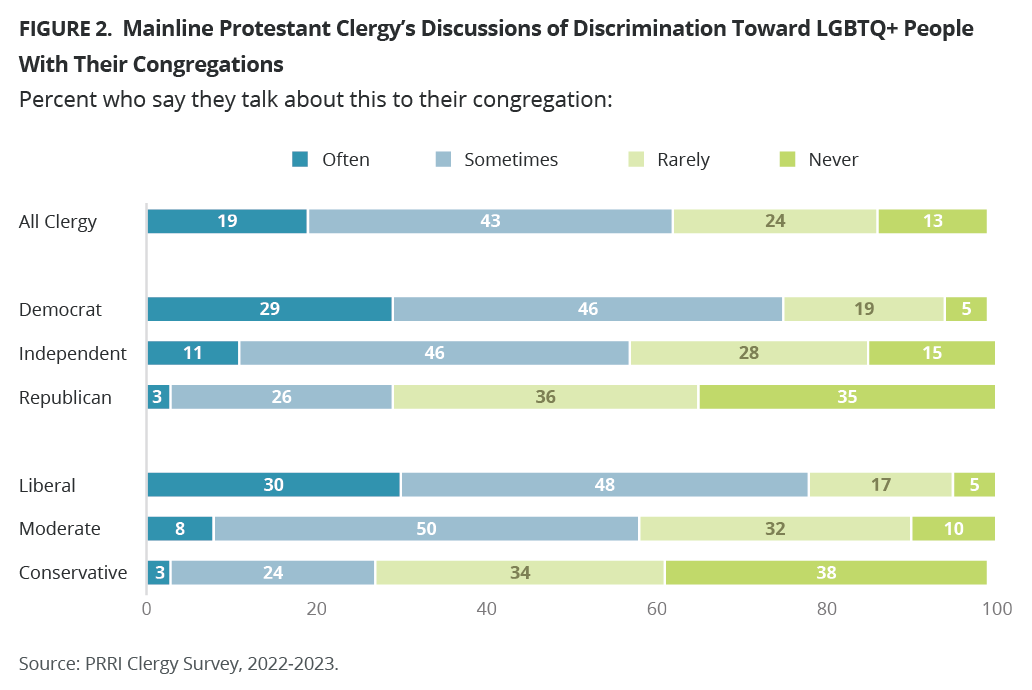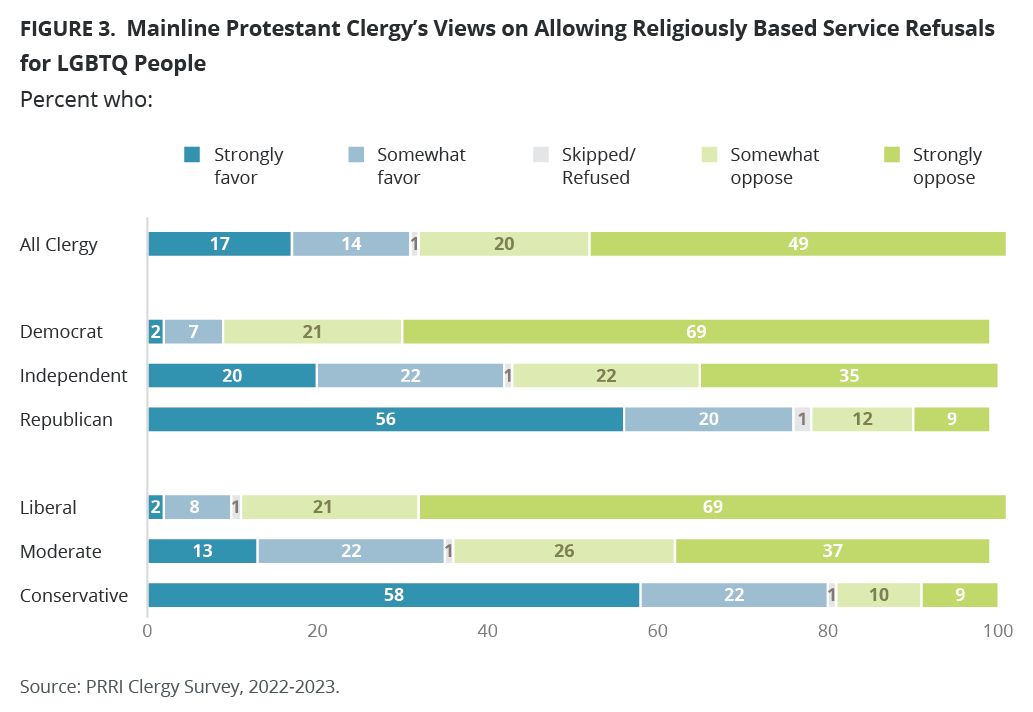Before the 1960s, mainline Protestants represented the majority of American Christians.[1] Since then, the rise of evangelicalism and the decline in religious adherence more broadly has led to a decrease in the number of mainliners. Still, as a grouping, white mainline Protestantism remains one of the largest religious affiliations in the nation, comprising approximately 14% of the population, according to PRRI’s 2022 American Values Atlas. Mainliners thus represent an important, if understudied, segment of the public, even though the media’s focus on white evangelical views on LGBTQ+ issues often overshadows stories about more progressive Protestant positions. According to PRRI’s 2023 Politics of Gender, Pronouns, and Public Education Survey, white mainline Protestants tend to be more supportive of LGBTQ+ rights than their evangelical counterparts. And, based on PRRI’s 2022-2023 Mainline Protestant Clergy Survey, mainline ministers appear to be even more supportive of LGBTQ+ rights than their parishioners.
PRRI first surveyed mainline clergy in 2008, the year Proposition 8 passed to ban same-sex marriage in California, and seven years before the U.S. Supreme Court ruled that marriage was a constitutionally protected right extended to same-sex couples. Back in 2008, PRRI’s Mainline Protestant Clergy Voices found that 43% of ministers often addressed LGBT issues publicly and the majority (67%) were in favor of hate crime legislation to protect lesbian and gay people along with other minority groups who might be targets of violence. Most clergy (66%) also favored anti-discrimination laws in employment to prevent workplace hiring and retention bias based on individuals’ sexual orientation and gender identity. A smaller majority (55%) supported adoption rights for gay people. Ministers were divided in their views on same-sex marriage: 33% thought gay couples should be allowed to marry; 32% that gay couples should be allowed to form civil unions, but not marry; and 35% thought there should be no legal recognition of a gay couple’s relationship.
In the last 15 years, mainline Protestant clergy’s opinions on same sex-marriage have shifted dramatically in support of same-sex unions. Clergy have also become more likely to discuss LGBTQ+ issues with their congregations. And, despite mainstream media narratives that pit religious freedom against LGBTQ+ rights, mainline clergy overwhelmingly oppose discrimination against LGBTQ+ people.
Key Finding #1: Today, 79% of clergy favor allowing gay and lesbian couples to marry with the highest support coming from ministers who self-report being politically liberal (98%), identify as Democrats (95%), are between the ages of 20 and 39 (95%), reside in the U.S. West (93%), and are female (93%). When it comes to clergy who do not support same-sex marriage (20%), the strongest opposition comes from ministers who self-report being politically conservative (67%) and identify as Republicans (66%).

Key Finding #2: Mainline Protestant clergy have also become more likely to discuss LGBTQ+ issues with their congregations. The latest PRRI survey reveals that 62% of clergy often or sometimes talk to their congregations about discrimination toward LGBTQ+ people. Although discussions about LGBTQ+ issues have proliferated, the percentage of clergy who never discuss them has remained the same as it was in 2008, at 13%. Clergy who identify as conservative are the least likely to discuss anti-LGBTQ+ discrimination: 38% of them never discuss it, compared to 10% of moderate clergy and 5% of liberal clergy. Similarly, 35% of clergy who identify as Republicans say they never discuss LGBTQ+ discrimination, compared to 15% of independents and 5% of Democrats.

Key Finding #3: The majority of mainline Protestant clergy (69%) oppose allowing a small business owner to refuse to provide products or services to gay and lesbian people, even if providing the goods or services violates business owners’ religious beliefs. The only exceptions to this consensus are clergy who identify as Republican and conservative — 76% and 80%, respectively — who favor allowing small businesses to refuse products and services to gay or lesbian people.

Overall, mainline Protestant clergy have become more supportive of LGBTQ+ rights and more vocal on LGBTQ+ issues. Despite the recent Supreme Court decision that allowed an evangelical wedding website designer to refuse to provide services to LGBTQ+ couples, many Christian leaders reject the narrative that one’s religious beliefs, however sincerely held, should give license to discriminate against vulnerable populations.
Suzanna Krivulskaya, Ph.D., is a member of the 2023-2024 cohort of PRRI Public Fellows.
[1] The seven largest mainline denominations are the United Methodist Church, the Evangelical Lutheran Church in America, the American Baptist Churches USA, the Presbyterian Church (USA), the Episcopal Church, the United Church of Christ, and the Christian Church (Disciples of Christ).